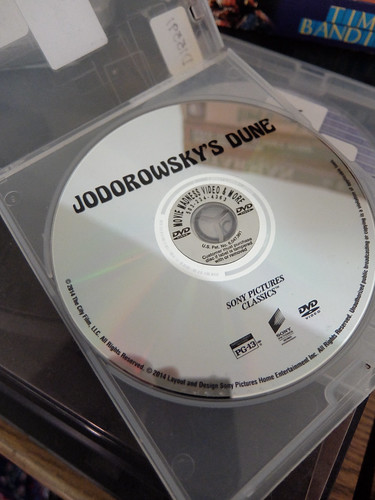This documentary bills itself is being about "one of the greatest movies never made". The issue is Jodorowsky is from the "strong director" school and with such an ambitious film planned, investors in the Hollywood community couldn't stomach the risk. I don't blame them and wonder why other movie-funding networks were not approached. El Topo may have been a big hit in Europe, but fewer North Americans have ever heard of it, let alone Holy Mountain (which I've seen, though not on the big screen it deserves).
Jodorowsky comes across as in control of his talent. At 85 and looking back on a dream "not coming true", he now sees in what ways his contribution was completely real and impactful. I thought his son summed it up best: Jodorowsky's Dune is a lot like Paul, slain in the end, only to be resurrected in the souls of others.
What Jodorowksy's Dune did become: a complete comic book / storyboard for the entire film; a platform for future collaborations / relationships within film-making (all that rigorous training in martial arts would certainly have opened doors for his son, cast as Paul). He had approached and was planning to cast in cameos: Orson Welles, Mick Jagger, Salvador Dali, David Carradine, with music tracks by Pink Floyd. His morning pep talks to the developers would certainly have been inspiring.
Judging the precise influence of these spin-offs (precessional by-products to use Bucky's language) is impossible, which is maybe another way of saying "immeasurably great" in some dimensions (as we say of the space program, likewise a junkyard of unfunded yet influential draft projects). All the big studios got their free copy / proposal of the comic book (the 2D stills rendering, the storyboard).
For example, the idea of a POV shot from inside a robot, how that might render, with foreground information, as in heads-up displays, gets clear graphical treatment in the comic, only to show up quite like that in films going forward, e.g. Terminator and Star Wars.
Yes, such imagery bubbles up through the Zeitgeist and the director himself spoke about "channeling" so there's no need for direct attribution or intellectual property debates. He recruited some of the very best talent in the business around a compelling vision, creating a giant-castle-based "meme factory" for many films to come; the developers literally rented a giant castle aimed at gelling the vision, from script to storyboard -- something we've also done in the software industry for coding sprints.
I agree with the talking heads who say the shared head space of movie-goers would have been different given this alternative past in which said movie had actually been funded. Would this have been the blockbuster game changer Jodorowsky imagined it would be? We'll never know in those terms, but as the director himself makes clear, the comic book is substantial enough to give rise to a the full blown picture, even posthumously, perhaps as an animation. The documentary teases us with the possibility.
David Lynch got a crack at making the film, and Jodorowsky was gratified to see it didn't completely fill the void i.e. another could still be made. Lynch's needn't be seen as the canonical Dune.
The talking heads make a good point though: psychedelic fervor was at a peak when the film appeared most likely to be made. We're a bit like a surfer waiting for a next wave perhaps.
The lower budget yet effective style in Serenity comes to mind. Joss Whedon might do a good Dune. But then maybe he, like me, was never super-thrilled by the novel in the first place. That's not meant as a damning remark, more that of a potential future fan, still willing to be persuaded.
In the meantime, El Topo is now at the top of my queue. I'll look for it at Movie Madness when I return these (a well-made docu-drama about Alan Turing was my other investment this time, having previously plowed through a season of Longmire).

